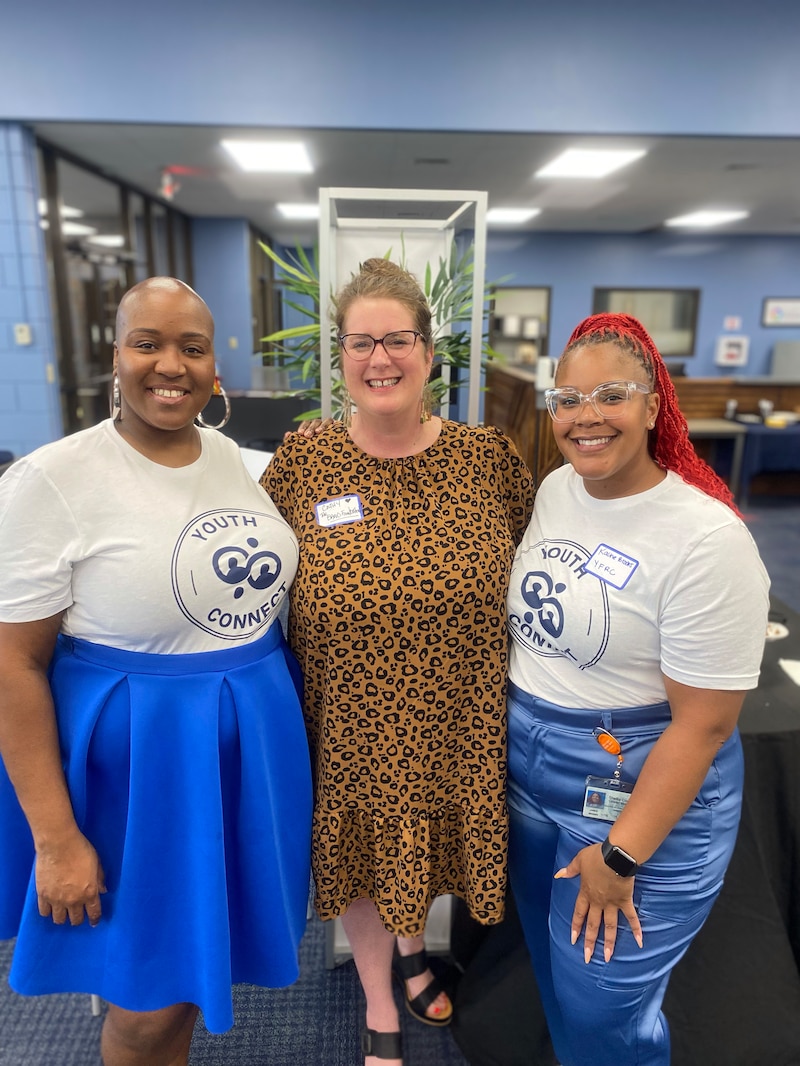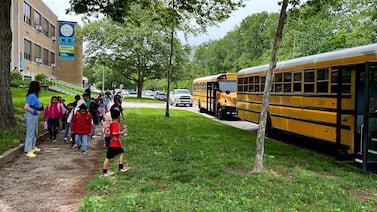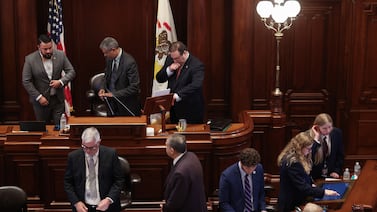Sign up for Chalkbeat Tennessee’s free newsletter to keep up with statewide education policy and Memphis-Shelby County Schools.
Peyton Golden said she knew she needed mental health support last spring when she started struggling to control her feelings.
“Sometimes I gather too many emotions at once, and I just start lashing out,” said Golden, 15, a sophomore at Power Center Academy High School in Memphis. “It was making me lose opportunities. It was making me look like a bad person, and I’m not a bad person.”
Golden said she was nervous to ask about starting therapy because it can be expensive. Then earlier this year, her mom found out about Youth Connect, a program run by the Shelby County Youth and Family Resource Center and local nonprofit The Braid Foundation that offers teens 12 free sessions with a Memphis-based therapist.
Golden started seeing hers in May. She and her therapist practice daily affirmations to boost self-confidence, Golden said, and work on developing skills to cope with overwhelming situations at school.
“I’m so proud of how far I’ve come,” Golden said. “Now, I can express my feelings, and I can say, ‘Wait, can we come back to this conversation when I calm down?’”
Youth Connect has provided free therapy outside of school to 345 young people in the Memphis area since it launched in May 2024. That is far fewer than Memphis-Shelby County Schools’ own mental health services, which serve over 6,000 students in group or individual therapy each year. But those who work in schools and with young people say Youth Connect is filling an important need, especially since a 2024 state law restricted certain kinds of mental health help schools can provide.
Youth Connect’s teenage clients, many of whom are MSCS students, say the program also offers more autonomy and privacy than in-school services.
Donna Goings, director of MSCS’ mental health centers, said the school system and Youth Connect work closely together. They often refer clients to each other, she said, and can share information about mutual clients if given permission from the student or their guardian.
“I know there’s a belief out there that a child shouldn’t have more than one therapist,” Goings said. “But we communicate with [Youth Connect] to ensure that we’re both on the same page, and helping that child to really be the best person that they can be.”
A program designed with teen choice in mind
Youth Connect started as a response to rising mental health needs during the COVID-19 pandemic. But it’s become more about addressing persistent issues in accessing youth mental health care locally and statewide.
Tennessee ranks as one of the worst states in the country for youth mental health, with high rates of mental health conditions and low access to care. In 2021, for example, more than half of 12-to-17-year-olds struggling with depression in Tennessee did not receive help. Nearly a quarter of Shelby County high schoolers reported seriously considering suicide that year.
To sign up for Youth Connect, teens and their families fill out an online form, and then choose a provider from a list of over 20 vetted therapists using their personalized video introductions.
“I am not a person that trusts off the bat,” Golden said. “But I felt very secure going into this,” she added, because she chose a therapist that best matched her experience and needs.
Right now, Youth Connect clients complete around six free therapy sessions on average, program leaders said. But some, like Golden, use all 12 free appointments and then continue working with their therapist.
Cathy Emerson, co-founder of the Braid Foundation and one of three Youth Connect leaders, said they designed the program with teen autonomy in mind. Before launching, Emerson said her team talked to over 300 young people about how they wanted free mental health support to look.
The responses were clear, she said: Young people want to choose their own therapists. And they want mental health care outside of school.
“In so many spaces, youth don’t have that autonomy of choice in their therapist,” Emerson said. “It’s either whoever’s assigned to their school, whoever their insurance covers, or whoever their parent or legal guardian is picking.”
With only a little over a year of service under their belt, Youth Connect leaders are already facing a funding deadline. The program is entirely reliant on federal pandemic aid, which is set to expire by the end of 2026. Emerson said they’re already looking for outside grants to replace that money.
The program takes about $350,000 to run per year, but Emerson says she’s seeking some $650,000 to expand their services, including to 18- to 24-year-olds.
“We absolutely hope our local leaders continue to invest in youth and community wellness,” she said. “At the same time, we know sustainability means diversifying funding.”
Youth Connect fills gaps in Memphis mental health care
In 2020, a group of nearly 80 Memphis-area nonprofits and practitioners started pushing the local government to fund targeted mental health support for young people. The Shelby County Commission responded in June 2021 by setting aside a little over $1 million in federal pandemic relief money for what would become Youth Connect.
Unlike some other free services, Youth Connect is also universal for teens ages 13-18, said Braid Foundation co-founder Shaneika Smith. That means families don’t need to prove their income level or insurance status to access it.
Smith said program leaders also insist on paying local therapists a sustainable wage, at close to $140 per session.

Brandi Rhoden, one of the Youth Connect therapists, said families used to turn down her help because they couldn’t afford therapy while reliant on Medicaid or without health insurance. Now, she can help them sign up for Youth Connect.
As an out-of-school option, Youth Connect is smaller but more flexible in some ways than in-school MSCS services. The program is also able to provide therapy to clients 16 and older, who can sign up without parent consent.
While Youth Connect leaders say very few teens sign up without parent permission, the option differs from school requirements for explicit parent consent on student mental health services. The 2024 Tennessee Families’ Rights and Responsibilities Act expanded that active permission requirement to school-wide assemblies on suicide prevention and bullying, following a nationwide push for more parent oversight in public education.
But the district currently has over 80 therapists and social workers on staff that can diagnose and treat students with mental health conditions on an individual or group therapy basis, she said, which not all school systems are equipped to do.
Most MSCS clinicians work in two schools, Goings said, and they can sometimes have waitlists for therapy services. That comes with the challenges of working in a time-constrained school environment, she added.
“We can’t take them out of a certain class, so we have to work around their academic schedule,” Goings said. “And we definitely try to include the parents in everything, because we are a school setting. We do not want to alienate parents.”
Emerson said Youth Connect leaders are still working to expand their own client numbers. This school year, she said, they started working with six local student volunteers to spread the word.
Dulce Ordonez is a 17-year-old student at Middle College High School. She said addressing stigma around mental health care, especially in Latino communities, is one of her main goals as a Youth Connect Ambassador.
“A lot of Latino people would often say that mental health is not important, or ‘you’re just crazy,’ or mental health is not real,” Ordonez said. “But some parents don’t really realize the importance of mental health within their families, their relationships, or their children.”
Clients like Golden offer valuable testimonies, too.
“People my age have our guard up with trust and everything, but it’s okay to let that wall down,” Golden said. “There’s a lot of suicide going on our generation. With the world that we live in, we need more trusted adults around us.”
Bri Hatch covers Memphis-Shelby County Schools for Chalkbeat Tennessee. Reach Bri at bhatch@chalkbeat.org.





